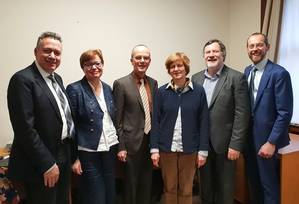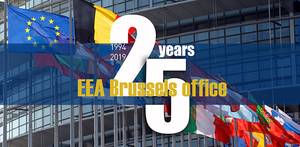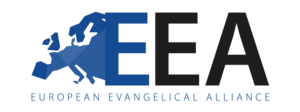Evangelical Focus (Barcelona), used with permission
(Bonn, 18.02.2019) The European Evangelical Alliance (EEA) celebrates the 25th anniversary of its Brussels office. The mission of the EEA is to represent Europe’s 23 million Evangelicals from 33 countries to the European Union.
 The celebrations in Brussels started with a round-table on integration of Muslims in Europe. Main speakers were Christine Schirrmacher (Islamic Studies at the University of Bonn/Germany and the Evangelical Theological Faculty Leuven/Belgium) and Peter Adams (St Marys Centre for Peace and Reconciliation Luton, UK).
The celebrations in Brussels started with a round-table on integration of Muslims in Europe. Main speakers were Christine Schirrmacher (Islamic Studies at the University of Bonn/Germany and the Evangelical Theological Faculty Leuven/Belgium) and Peter Adams (St Marys Centre for Peace and Reconciliation Luton, UK).
In a first session, Professor Schirrmacher emphasised that we cannot understand Islam in Europe without the context of Islam in Saudi Arabia and in the Middle East. “Christians can play an important role as a kind of mediators between Muslims and politicians,” she said. Christians and committed Muslims share the desire to live according to ethical values derived from their faiths, and know what it is to be “in the world but not of it.” Secular Europe struggles more and more to understand this. Christians can also share their ethical values with Muslims and learn from them about what their faith means to them, as both live in a secular context in Europe, not in a religious one.
In the second session, Peter Adams shared from his experience in Luton, UK, working with the Muslim community in a city known for much upheaval and even violence, and trying to argue with groups like the English Defence League and Britain First. Over the years, Adams has developed strong working relationships with Muslims in Luton. Together, they have been working for the common good.
The Round-Table closed with a lively discussion between the two speakers themselves and with the representatives from several national evangelical alliances attending.
The celebrations then continued with a service of thanksgiving for the past 25 years at the Chapel of Europe. Round table guests were joined by Brussels related friends of the EEA, both present and past. The evening concluded with a joyful reception.
Plans for the future
 Good relations with people working in the European Institutions and with like-minded organisations have been very important in the past 25 years. The EEA will continue to maintain and build these friendly and constructive relations.
Good relations with people working in the European Institutions and with like-minded organisations have been very important in the past 25 years. The EEA will continue to maintain and build these friendly and constructive relations.
The EEA will continue its work in defending and promoting freedom of thought, conscience, and religion. This important human right is closely linked with Freedom of Expression. We will continue to advocate for a civil public square with a place for a wide variety of voices, including the Evangelical one.
In the run up to the European Elections in May, the EEA will work with its national member organisations in mobilising Evangelicals across Europe. The EEA challenges its constituency to engage European politics and to look beyond the easy sound bites.
General info on EEA and its Brussels office
 The EEA Brussels office represents 23 million European Evangelicals from 33 countries to the European Union. The EEA Socio-Political arm helps national Evangelical Alliances to develop their social, advocacy, and religious liberty ministries.
The EEA Brussels office represents 23 million European Evangelicals from 33 countries to the European Union. The EEA Socio-Political arm helps national Evangelical Alliances to develop their social, advocacy, and religious liberty ministries.
In 1994, the EEA appointed Julia Doxat-Purser to set up the Brussels office and to engage European circles. This decision was the outcome of a thorough internal discussion about how the Evangelical community should relate to what was then the European Community.
Among the priorities of the EEA’s socio-political programme and therefore the Brussels office are Freedom of Religion or Belief and Freedom of Expression for all, human dignity and the sanctity of life. The socio-political programme encourages the 23 Million Evangelicals across Europe to constructively engage politics and to work for the common good.
Information about the speakers
Christine Schirrmacher (PhD) is currently professor of Islamic Studies at the University of Bonn/Germany and the Evangelical Theological Faculty (ETF) Leuven/Belgium. She is also engaged with teaching at different government institutions and continuing education programs related to politics. Recently, she has been appointed to the „Academic Advisory Council of the Federal Agency for Civic Education“ by the German Federal Minister of the Interior and to the „Advisory Board of the German Institute for Human Rights“. Her research interests are transformation processes of culture, society, law and theology in the Middle East in the 19th and 20th century, Islam in Germany and Europe, interreligious dialogue and theological controversies, Sharia law, women’s, human’s and minorities’ rights, religious freedom and political movements in the Middle East.
Peter Adams has worked in community peace building based in the town centre Parish Church of Luton, England, for the past twelve years. As a committed evangelical, he worked in missions for over 25 years, most recently teaching and consulting in intercultural relations and conflict. He was invited in 2007 by the church minister to join the team to help equip the churches in the town for their work in its very multicultural community. He is director of the newly formed St Marys Centre for Peace and Reconciliation.





Stay Connected